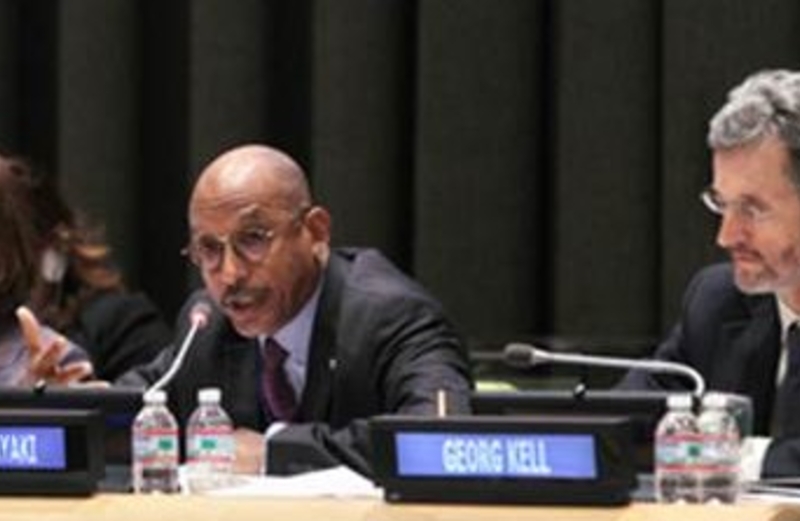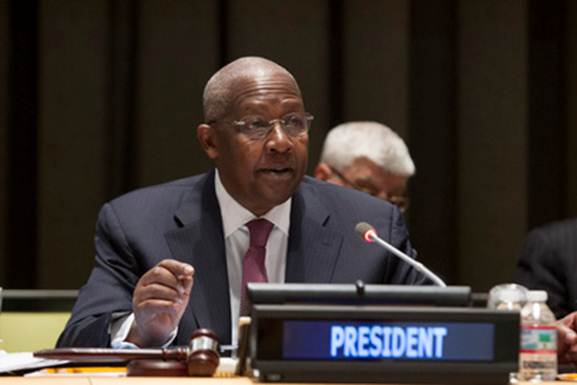NEPAD at high-level debate on Post-2015 Agenda

NEPAD Agency CEO Dr Ibrahim Mayaki has reiterated the importance of prioritising regional infrastructure development, so as to achieve structural transformation for an inclusive and people-centred development on the Continent.
“If Africa wants to industrialise, the first priority is infrastructure, not national but regional infrastructure because structural transformation will come out from it,” Dr Mayaki said this week at a UN General Assembly’s High-Level Thematic Debate on Infrastructure Development in the Post-2015 Development Agenda in New York.
Dr Mayaki spoke on the Common African Position (CAP) in which African leaders have committed themselves to speak with one voice and to act in unity to ensure that Africa’s priorities and needs are heard and fully integrated into the new global development agenda.
This year marks the deadline of the Millennium Development Goals (MDGs), which world leaders agreed on 15 years ago. There has been significant progress in meeting some of the targets such as halving global poverty and the number of people lacking access to improved drinking water, according to the UN. But many challenges persist and not all of the goals have been achieved. The Post-2015 Agenda is the successor framework to the MDGs towards securing a sustainable future for all.
Dr Mayaki highlighted NEPAD’s Programme for Infrastructure Development in Africa (PIDA) which prioritises key trans-boundary infrastructure projects requiring capacity for project preparation and regulatory frameworks as well as monitoring and evaluation. He emphasised that there is not a lack of resources for implementation but a lack of bankable projects. The NEPAD Agency is tackling this niche in designing the PIDA Service Delivery Mechanism (SDM) to help in the project preparation stage, Dr Mayaki said. He also cited examples of successful partnerships such as the Sustainable Energy for All (SE4All) Initiative and the Dakar Financing Summit as a clear commitment by global and African leaders to unlock regional infrastructure.
The high-level thematic debate addressed the issue of mobilising adequate means of implementation such as financial resources, technology development and transfer as well as capacity building in order to deliver on and implement a truly transformative and ambitious post-2015 development agenda.
The event brought together parliamentarians, UN Agencies, international financial institutions, regional development banks, the private sector, civil society, academia and other relevant stakeholders involved in the process of finalising the framework.
Dr Mayaki highlighted that Domestic Resource Mobilisation (DRM) is taking off in Africa, but urged that Illicit Financial Flows from multinationals that are not paying their taxes are to be taken into account and the capacity to enforce the regulation should be strengthened.

In his closing remarks, President of the UN General Assembly, Mr Sam Kutesa (above) underscored the need for better financing, in order to effectively implement post-2015. He reiterated that "a huge financing gap for infrastructure" remained despite sufficient global liquidity.
The CEO also participated in a side-event organised by UN Conference on Trade and Development (UNCTAD) Secretary-General, Mr Mukhisa Kituyi, entitled "Making the Sustainable Development Goals Work: harnessing trade, investment, finance and technology for sustainable development". Dr Mayaki reiterated the importance of the regional dimension of development programmes and the important role the Regional Economic Communities play in Africa. He illustrated the potential of DRM by making a practical example on how a 2-point increase in tax collection can sometimes make a country independent from aid, while emphasising the critical role of extractive industries for Africa’s development.

Dr Mayaki seized the opportunity of his visit in New York to meet with the African Group of Negotiators (AGN-P2015) and experts in charge of the Post-2015 agenda, the Sustainable Development Goals, and the Financing for Development negotiations. The CEO briefed them on the financial needs and good return on investments for infrastructure projects in Africa and the importance of capacity building in negotiating Public Private Partnerships. He also highlighted the paradigm shift between the situation when the MDGs were adopted and the current context which is more favorable for the African continent in articulating the SDGs; as well as for AU decisions and African regional frameworks (such as CAADP, PIDA, AIDA, EAP, etc.) to be implemented.
